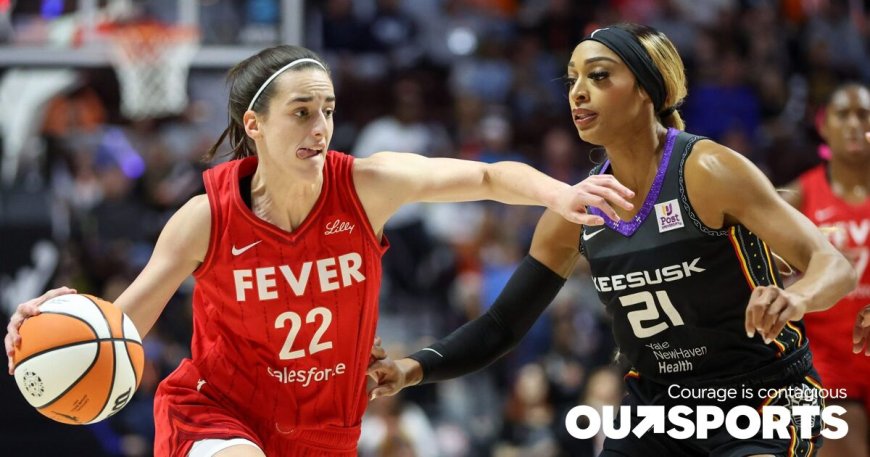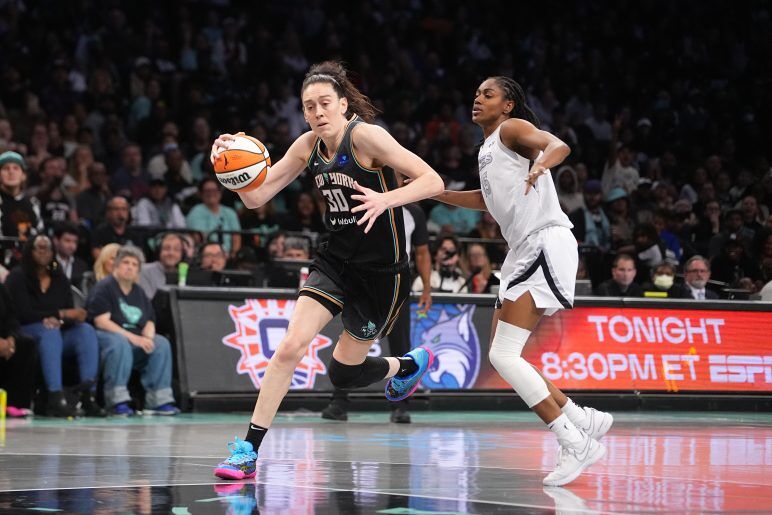Fear, loathing and Caitlin-mania displayed WNBA’s new growing pains
Despite ratings and attendance records, old tropes surrounding race and orientation still linger, and maybe grew, in 2024. The post Fear, loathing and Caitlin-mania displayed WNBA’s new growing pains appeared first on Outsports.


The WNBA should be basking in the sunshine of a breakthrough season. The arenas are full, TV ratings, and notice the WNBA feature on 60 Minutes Sunday night.
So why does it all feel swollen and irritated like Caitlin Clark‘s eye after the Indiana-Connecticut playoff game last week?
The poke that the 2024 WNBA Rookie of the Year received from All-Defensive first-team selection DiJonai Carrington was the catalyst for the media eruption this past week from what has bubbled all season.
The growth and optimism that started this season devolved into allegations of jealous veterans, “angry Black lesbians”, and a heavy level of social media rancor to go with increased attention and engagement.
Get off the sidelines and into the game
Our weekly playbook is packed with everything from locker room chatter to pressing LGBTQ sports issues.
Subscribe to our Newsletter today
The tension brought by some fans for the second game of the Indiana-Connecticut playoff series is something sportswriter Frankie de la Cretaz noted in a item for Andscape last week. A fan quoted in the article said the actions of the Indiana/Caitlin Clark partisans “felt rabid.”
The tenor grew worse from an interview involving Carrington and the Washington Post’s Christine Brennan. After asking about the play, and Carrington responding how it was just something that happens in a game, Brennan seemed (to many) to insinuate that Carrington and a teammate where laughing about it, as if to say Carrington intended to gouge Clark’s eye.
The response and critique of Brennan’s follow-up question was swift. The Women’s National Basketball Players Association president Terri Jackson responded through a statement calling Brennan “unprofessional.”
“That so-called interview in the name of journalism was a blatant attempt to bait a professional athlete into participating in a narrative that is false and designed to fuel racist, homophobic and misogynistic vitriol on social media,” the statement read. Carrington is publicly out as LGBTQ.
“You have abused your privileges and do not deserve the credential issue to you,” the statement continued. “Those credentials mean that you can ask anything, but they also mean that you know the difference between what you should and should not.”
Such an atmosphere seemed okay to WNBA Commissioner Cathy Engelbert, when she was asked about it on CNBC’s power lunch September 9. Unlike the previous four chief executives of the WNBA, the first to wear the title of “Commissioner” owned up to a long-standing ambition of the 27-year-old league.
“This a little bit of that Bird-Magic when they came from 1979,” Engelbert pointed out as a comparison to Clark and fellow rookie and 2022 NCAA finals rivals Angel Reese. “Those two rookies came in from a big college rivalry, one white, one black. We have that moment with these two, and the one thing I know about sports is you need rivalries. That is what makes people watch.”

If there is one thing the WNBA has strived for in its history, it is to be seen as a “major” league in the eye of the traditional, mostly male, gatekeepers of such status in sports media and sports fandom. It has strived to lean into a certain level of respectability that is palatable to “traditional sports fans,” defined as a largely male, cisnormative and heteronormative audience.
Daughters looking up to heroes who look like them with parents in tow? Great!
Male hoop fans giving women’s hoop at the highest level a look? We hope!
Those two women in the stands holding hands? Uh….well…I guess?
It’s no secret that the WNBA has a sizeable lesbian following. When it comes to officially acknowledging that fan base however, the WNBA throughout its history has sought to maintain an arms-length approach.
The Jason Whitlock/Clay Travis trope that the league is “70% lesbian” and is a “lesbian sex party” is the worst nightmare of the WNBA brass. In reality, about 30% of the league, according to a study done in 2022, identify as lesbians and about 20% are publicly out. Some of those are among the biggest stars of the league.

Carrington, also named the league’s Most Improved Player this season, is one of the out players. Her girlfriend, NaLyssa Smith, ironically plays for Indiana.
Given this, and the vitriol Carrington has received for fair criticism of Clark in the past, I can understand, and even agree with, the pushback Brennan received from their interview.
The first question was right and fair, but I can’t fault anyone for reading the follow-up question as an attack on Carrington and a teammate’s character. Brennan should have been cognizant of that, given the tenor of discussion leading up to that interview.
The attention that Clark has received has led to some criticism of her, and it indirectly plays into the criticism on Englebert’s perceived indifference by some when she described her views on building the league.

One of those who voiced her concerns recently is New York Liberty all-star Breanna Stewart, one of the prominent white, gay faces of the WNBA, suggested players with Indiana and others should be speaking out against any fans’ racism.
“If it was me? I would,” Stewart said to New York Liberty Fan TV last week. “That is really the kind of position I want to be in because I want my fans to be inclusive of all and to understand and realize how hard these women are working on the court.”
Some of the league’s Black players have been saying much the same for most of the season as some of the nastiness for people who, to quote the Atlantic’s Jemele Hill, “people who have weaponized her (Clark) to express their hatred of Black and LGBTQ+ women.”
Clark spoke out on this last week when asked, saying, “those aren’t fans, they’re trolls.”
The WNBA has pushed for a breakthrough since it began, and it came this season. However, hopes based on a paradigm of sports past are rubbing raw against veteran players and longtime fans who have never seen the WNBA through the prism built by “traditional” (read: cishet, mostly white male) beliefs about big-time sports.
Growth is almost always awkward. Yet, the WNBA’s talent pool and fan base are quite equipped to deal with it, perhaps more than other major sports league.
The issues presented here aren’t new. Now is the time for Engelbart, the owners of the teams, and the press who cover the sport both experienced and new, to really step into, discuss, listen and learn while also helping to craft a course where bottom line and higher ideals can not just coexist but come together.
In the meantime, the Sun, Lynx, Liberty and Aces are still alive in the playoffs. Enjoy the show. I know I will.
Subscribe to the Outsports newsletter to keep up with your favorite out athletes, inspiring LGBTQ sports stories, and more.
The post Fear, loathing and Caitlin-mania displayed WNBA’s new growing pains appeared first on Outsports.

 Mark
Mark 





